Cuban Characters
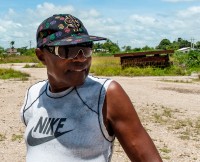
Humberto Casanova Corbea (Cuco)
Cuco is the eldest grandchild of Florinda Diago, and was raised by her after his mother’s death. He was encouraged by his grandmother to be proud and make his own way in life and eventually became one of the best-known music promoters in Cuba. Of course, spending his childhood with Florinda meant that he had been brought up immersed in the Gangá-Longobá traditions and heritage. Now in his ‘70s, Cuco is well known through the Matanzas region. He was proud to be part of the small group going back to their ancestral home.
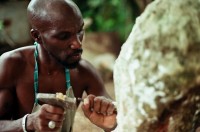
Alfredo Duquesne Mora (El Duque)
Every in Perico knows ‘The Duke’. He is an artist, woodcarver and stonemason whose work has been exhibited throughout Cuba. The nephew of Piyuya, he lives in his studio beside her house and uses the yard—known as ‘La Selva’ (‘The Jungle’)—as his gallery. He has long honoured the ancestors through his carvings and was extremely excited about the trip to Africa, considering it a reconnection with the motherland. On the trip Alfredo stepped into the role of ‘speaker’ for the group, eloquently and emotionally describing the importance of the reunion and forming tight bonds with many of the Africans, especially Baggie. For Alfredo, meeting his long lost brothers and sisters, and finding himself so accepted, was one of the seminal moments of his life. The people in Mokpangumba named him Sinava, and that name was heard being shouted wherever we went around the village.
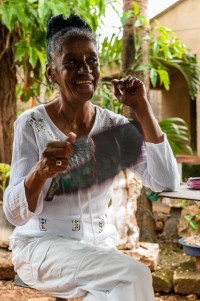
Elvira Fumero Añi
Elvira is the only central member of the group who is not descended from either Maria-Luisa or Florinda. Born into a family that had been relatively wealthy before the revolution, she was drawn to the Gangá-Longobá’s songs and dances as a child especially as she is unaware (as are many Afro-Cubans) of her own African ethnic heritage. She grew up to be a singer and was incorporated into the group after having been informally adopted by Piyuya as a goddaughter. She is now gradually taking over from Piyuya as the lead singer of the Gangá-Longobá and was chosen to go to Africa in that role, revealing the inclusive nature of the group’s sense of history and identity. For Elvira, as for Alfredo, the acceptance offered by the Sierra Leoneans was a transformative experience that will always be remembered. Fittingly, after a life of many struggles, the people of Mokpangumba chose for her the name Jillo, meaning she who survives.
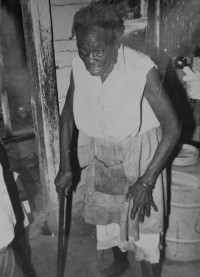
Florinda Diago
One of nine siblings, Florinda grew up on Clemente Gomez Street in Perico, where the extended Diago family moved after the end of slavery in Cuba. She learned the songs and dances of her ancestry from her great-grandmother Josefa and later took over the role of leader of the Perico Gangá-Longobá. She was popular in the region for her skill with herbal medicines. Interviewed by Lydia Cabrera in the 1950s, many of her songs went to the USA when Cabrera fled after Castro came to power, where (unknown by the family in Perico) they have been digitally preserved. Florinda passed away in the 1980s but much of the present strength and vibrancy of the Gangá-Longobá results from her strong and dedicated leadership.
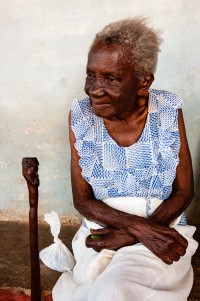
Magdalena Mora Herrera (Piyuya)
Piyuya was Florinda’s goddaughter and the daughter of Maria-Luisa, Florinda Diago’s closest confidante. She was born in the house next door to the Gangá-Longobá shrine and at a young age began to compose songs, at least one of which is now part of the Gangá-Longobá repertoire. Following the deaths of Florinda and Maria-Luisa, Piyuya was chosen to jointly lead the Gangá-Longobá. Into her 80s she remained a formidable force and could still sing and dance all night at the annual San Lazaro celebrations each December 17th. Sadly too frail to make the trip to Africa, she supported the venture from Cuba and remained very much the driving force behind the group until the end of her life. She passed away in 2015, not long after having met the Sierra Leonean Ambassador to the UN, who travelled to Perico to welcome her and the rest of the Gangá-Longobá as countrymen.
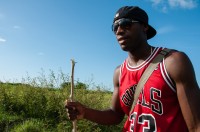
Yandrys Izquierdo Casanova
Yandrys is the youngest of the group: he is Cuco’s eldest grandson and a potential future leader of the Gangá-Longobá. Cuco never pressured him to be involved but several years ago Yandrys picked up a drum and began to play, and from there he became a central player in the group. He now plays the largest of the group’s drums and is a dedicated musician.
Sierra Leonean Characters
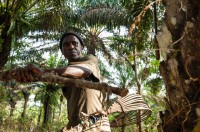
Baggie Kpanabum
Baggie is a farmer in Mokpangumba, growing palm kernels, cassava, rice, bananas and plantains. Growing things is his passion. He was born in Mokpangumba and has lived his whole life in the village, staying even when the civil war caused most people to flee. He has two wives and six children and learned the village’s cultural songs and dances from his parents, later being hired to go and perform in other villages. He was formerly the chief speaker of the village and now acts as the base drummer in the Mokpangumba cultural group, although he is also a fantastic dancer. Involved in the project since the first day Emma visited the village, Baggie showed his sense of fun by challenging Alfredo to a dance competition the afternoon the Cubans arrived. It was declared a tie and the two became firm brothers despite the language gap. Baggie hopes that the positive influences of the project can continue after the film and believes that God led the family back together for the benefit of all.
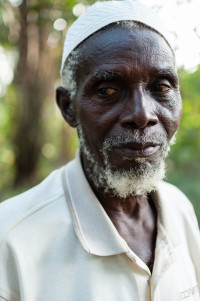
Joe Allie
Pa Joe is one of the elders of the village and has lived and worked in Mokpangumba his entire life. He is one of the descendants of the founding families of the village and is the uncle of Chief Pokawa. He owns a plantation on the fringes of the village where he has orange, grapefruit, coconut and mango trees. He is teaching his Banta and Mende heritage to his hoard of grandkids and was overcome with emotion and utter surprise hearing the Cubans sing one song that was once his grandfather’s favourite, a tune that he had not heard since he was a child.
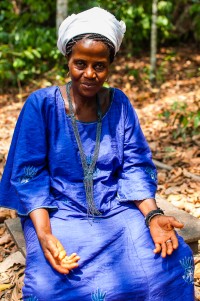
Lucy Amara
Lucy is the leader of the Bomusigie, the female members of the Menda society whose songs and dances the Gangá-Longobá have kept alive in Cuba. During the civil war Lucy fled to Bo, Sierra Leone’s second city, and it was during this time that the Menda society faded away, no longer able to initiate new members as their cultural house was partly destroyed by gunfire. Since the war Lucy has been trying to reinstate the Menda society and was deeply touched and inspired by the news that far away were unknown members who had kept the same traditions alive. As she relates in the movie, seeing the Cubans performing the same songs gave her the impetus and courage to reform the society.
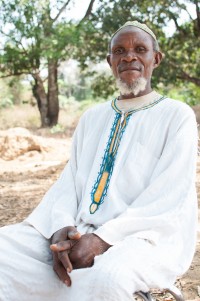
Mabadu Pokawa
Chief Pokawa is a descendant of Pokawa, one of the warriors who founded the village of Mokpangumba, which lies at the heart of the Upper Banta chiefdom where the Gangá-Longobá songs and dances originated. Pokawa was chosen over ten years ago to be the section chief (of Mokpangumba and the surrounding villages). As well as controlling the expansion of the village and surrounding farms, he judges disputes and acts as confidante to many of the young in the village. Having lost four homes when rebels burned down the village during the civil war, it has taken him more than ten years to raise enough money from farming to begin rebuilding a home for his large family. Chief Pokawa was in charge of arrangements for receiving the Cubans to stay in the village and asked whether they might be able to stay for longer to teach the young the old traditions that they have kept alive.
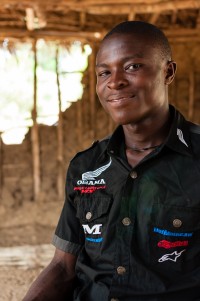
Solomon Musa
Solomon was born in Mokpangumba and was only a child when his father died during the civil war. Nevertheless, as members of one of the oldest families of the village—the descendants of Bangumba Musa—his father had already told him the songs, dances and oral history of the village. After his father’s death, Solomon went to live with an aunt in another village but later attended Mallory Jansen Secondary School at Ngolala Junction, an hour’s walk and a canoe trip from Mokpangumba. He is now working as a teacher in the village but hopes one day to be able to afford to attend further education. His dream is to study journalism. He is the football (soccer) team captain, active in the Christian church and is a self-professed “huge fan” of cultural dances. He was very enthusiastic about the visit of the Cubans—saying that he was receiving his own brother who has been gone for a long time—and was central to the project being able to be completed. It was also Solomon who, the first time Emma visited, turned to Baggie while watching a recording of the Cuban’s songs and dances, and said the words, “they are we!”
